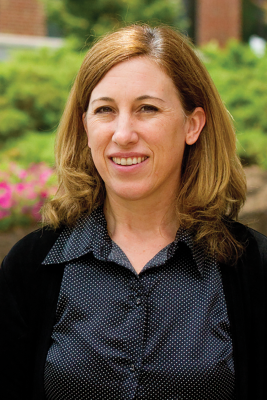
When Lisa Schirch was asked to teach a course on violent extremism at Eastern Mennonite University’s Summer Peacebuilding Institute, the peacebuilding expert and research professor took an online tour to gather ideas from other universities.
What she found was disappointing. Most courses offered at major universities, Schirch says, are oriented exclusively towards counter-terrorism, “focused on the use of police and military action.”
However, for this course titled “Peacebuilding Approaches to Violent Extremism,” Schirch wanted students to examine violent extremism through a wider set of perspectives. Even before she had determined her curriculum, the course filled quickly, eventually bringing together 26 SPI participants from 13 different countries. Their experiences varied widely, from Al Shabaab to Boko Haraam, from Muslim and Jewish religious terrorists and Daesh (ISIS) to radical Buddhist nationalists in Myanmar.
This fall, Schirch returns to the subject with a one-day course, “Understanding the Ecology of Violent Extremism,” Nov. 16 from 9 a.m.-4 p.m. at New York Avenue Presbyterian Church in Washington D.C. Registration is $75 and includes a light breakfast, catered lunch and a copy of a Little Book of Justice and Peacebuilding. Registrationis limited to the first 50 participants.
Full course returns for 2017 SPI
The full five-day course will be offered again at EMU’s Harrisonburg, Virginia, campus, during the 2017 Summer Peacebuilding Institute. Since 1994, the institute has helped more than 2,900 people from 124 countries gain skills and network with other peacebuilders.
Schirch says there is “not one cause of or cure for violent extremism.” Using the metaphor of bacteria growing in a petri dish, she notes: “We have to think of violent extremism in its full context. When you have corruption in the government, poverty, rapid changes caused by climate change, the media covering and glorifying violent extremism and making people famous for doing it, and when there’s religious extremism as well, all these factors are the ecology in the petri dish that enable violent extremism to grow. And you can’t stop there. Different responses to violent extremism, such as the use of drone bombs, cause a cascade of other reactions and problems, all of which contribute to whether the extremism continues, escalates, lessens or ends.”
Peacebuilding offers different approach to violent extremism
In the five-day course, participants spent mornings gaining basic understandings: exploring definitions of violent extremism, which vary in different contexts; looking at psychological, social, political, economic and religious factors contributing to radicalization; community resilience; responses to violent extremism; and legal contexts.
Legal frameworks often impede peacebuilding responses to violent extremism, Schirch says. “Peacebuilding is about reaching out and engaging people with extremist beliefs. But counterterrorism laws prevent us from teaching negotiation to people affiliated with extremist groups.”
Two guest speakers addressed violent extremism in the United States, a topic of special interest to the students considering recent political rhetoric. Robbie Abdelhoq MA ‘12, a doctoral candidate at the University of Toledo in Ohio, spoke about the harmful impact of FBI and police initiatives within the Muslim community. Adnan Ansari, program director at the Northern Virginia-based independently funded think-tank Muflehan, talked about consulting work in countering violent extremism, which includes, among other efforts, digital intervention and clergy/leader training.
In the afternoons, students participated in role-play scenarios with case studies from Schirch’s recently published Human Security: A Civil-Military-Police Curriculum. They also analyzed a specific violent extremism movement of their choice and provided a briefing on the final day.
“This class provided an opportunity to explore the wide array of causes underlying violent extremism in a safe, educational and controlled environment. Schirch’s experience in the field provided valuable insight on potential means to collaborate with my government in Lebanon to strengthen community resilience and responses to violent extremism,” said Fulbright Scholar Myriam Aziz, a former UNHCR staff member based in Lebanon and now a graduate student at the Center for Justice and Peacebuilding. “This is particularly important for us peacebuilders as we continue to fight criminalization for engaging and mediating with violent extremists groups.”
Global experiences shared in SPI course
Schirch frequently participates in policy conversations about violent extremism in Washington D.C., London and Geneva. But she believes the one-week course at EMU provides a one-of-a-kind opportunity for cross-cultural analysis of violent extremism.
“EMU may be the only place where you have people from this many different countries sharing and learning from each other about how violent extremism takes place in their country, both looking at how its unique and how its similar,” she said. “With this comparative lens, you start seeing interesting patterns and distinctions in how the government responds in different ways and how some governments have more success than others in countering it.”
To register for the DC Training Day, click here. The event is modeled after the Summer Peacebuilding Institute held on the Eastern Mennonite University campus every May and June. Click here for more information and the online application.










